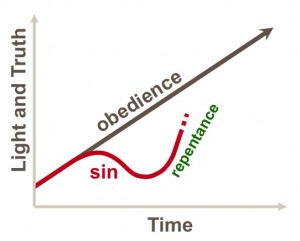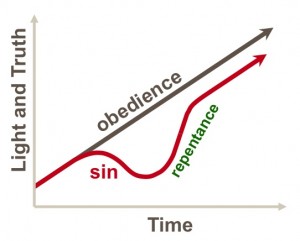 |
| Obedience versus Repentance. Sin definitely interrupts the steady growth that comes with obedience, but where exactly does repentance lead to? |
In a previous post (“I Am the Way … Unless You Find a Better One”), I introduced a chart used by Elder Merrill J. Bateman in a CES fireside broadcast. On it, he draws two lines. The first line represents obedience: it rises steadily over time, showing how aligning our will with God’s is the only way to meet our potential for growth and progress. The second line represents sin and repentance: it dips downward, then begins to rise again, fading in an upward direction. Elder Bateman explains, “Suppose one is traveling on the celestial path and commits a sin. The effect is a loss of light. Embracing evil lowers the trajectory of one’s path as the Holy Spirit withdraws.”((Spencer W. Kimball, The Miracle of Forgiveness (Salt Lake City: Bookcraft, 1969), pp. 339-60; cited in Spencer W. Kimball, “God Will Forgive, Ensign, Mar. 1982, p. 2. The omitted portion, indicated by ellipses, brings up an interesting point that I will address in another post.)) His chart aptly illustrates the fact that sin interrupts our progress and that only repentance can restore it.
One question hangs in the air: Where does repentance lead us, in comparison to what our condition would have been had we never strayed? In other words, where should Elder Bateman’s sin-repentance line end?
In a previous post (The Benefits of Sin?), I cited a few different experiences in which members of the Church have suggested that we are sometimes better off for having sinned and repented, because we learn and grow so much along the way. One severe problem with this notion is that it would mean that we penitent sinners are better off than Jesus Christ, because he never sinned. If sinning and repenting leads us to a better condition than perfect obedience, then we are privy to wisdom and attributes that the Lord himself—aw shucks—just can’t ever have because he doesn’t sin.
Better Off being Obedient
This notion is inimical to what we know about God’s laws and the Savior’s perfect example in “marking the path and showing the way.” President Spencer W. Kimball said of this notion,
Another error into which some transgressors fall, because of the availability of God;s forgiveness, is the illusion that they are somehow stronger for having committed sin and then lived through the period of repentance. This simply is not true. That man who resists temptation and lives without sin is far better off than the man who has fallen, no matter how repentant the latter may be. … His sin and repentance have certainly not made him stronger than the consistently righteous person. God will forgive—of that, we are sure. How satisfying it is to be cleansed from filthiness, but how much better it is never to have committed the sin!((Spencer W. Kimball, The Miracle of Forgiveness (Salt Lake City: Bookcraft, 1969), pp. 339-60; cited in Spencer W. Kimball, “God Will Forgive,” Ensign, Mar. 1982, p. 2. The omitted portion, indicated by ellipses, brings up an interesting point that I will address in another post.))
President Kimball clearly teaches against the notion that the path of sin and repentance leads us to a better condition than we would have been in if we had never strayed from obeying God’s commandments. There is, however, a way to misunderstand his words.
Irrecoverable Losses?
 |
| False Notion 2. Another mistaken idea is that repentance can never fully restore us to the condition we would have attained if we had been obedient. |
Because President Kimball says it is better off to never have committed sin, it might seem logical to complete Elder Bateman’s chart by drawing the sin-repentance line so that it always stays below the obedience line (see figure). In other words, once we have sinned, it would be impossible to ever regain the lost progress that is caused by sin, even after repenting. We are forever doomed to fall short of the potential we were created with.
Like the first mistaken notion (that sin and repentance leads us to a better place than obedience) this notion is also understandable (that sin and repentance can never recover the progress we would have made through perfect obedience). In fact, I think this idea may be a little more common in the Church than the first one. And I can see why.
For one thing, in our own experiences, even after we have repented of sin and know the Lord has forgiven us, there are still habits and other temporal effects to wrestle with. I may repent of swearing and never do it again, but I continually need to restrain the words that so naturally surface to my lips. A girl who has premarital intercourse may fully repent and be fully forgiven, but that will not remove the baby from her womb. A boy may repent of committing grave moral transgressions in high school and be fully forgiven, but he may not be able to go on a mission.2 These examples seems to indicate that the red sin-repentance line is perpetually lower than the obedience line, even with full repentance.
For another thing, many warnings against sin seem to require the conclusion that, if we are to take sin seriously, we must think of its effects as permanent and insuperable. To imply otherwise, some fear, would be to take sin lightly and lead people to let their guard down against temptation. Those are valid concerns.((I know I’ve heard a story that makes this point, but I’ve been unable to locate it. If I remember correctly, Heber J. Grant was speaking at a tabernacle, and he called up a man who had recently been rebaptized after falling away from the Church. President Grant told the congregation, “See? This is the power of repentance. He has everything back that he lost, and is now in full fellowship with the Church.” The man responded, deferentially but passionately, “But President Grant, I can’t get back everything I lost. I’ll never get my wife back, who I alienated through my actions and who is now married to someone else. I’ll never get back those 20 years I spent wandering aimlessly.” If anyone knows where this story can be found, please let me know.))
Problems
However, the idea that repentance can never fully recover the losses of sin, nor put us back where we would have been had we been perfectly obedient, goes counter to several statements by modern prophets and apostles. For example, Elder Boyd K. Packer has said, “If you have already made bad mistakes, there are ways to fix things up, and eventually it will be as though they never happened.”((Boyd K. Packer, “The Spirit of Revelation,” Ensign, Nov. 1999, p. 23. See also Vaughn J. Featherstone, [source].))
If we really believe Elder Packer’s teaching, then we cannot believe that repentance is unable to ever bring us back to the same condition we would have been in had we obeyed. Indeed, the entire promise of the Savior’s atonement would be undermined. In my next post, I will discuss how we can complete Elder Bateman’s chart to show (1) repentance’s ability to make us “joint heirs with Christ” in spite of our falling short of his perfect obedience, while also illustrating (2) President Kimball’s affirmation that it is always better never to have sinned in the first place. A key to this harmony is found in one word in Elder Packer’s statement.
Nathan—I really like the use of graphs. It helps us visual-type engineering geeks to understand the philosophy end of the gospel. Thanks!
Thanks, Dan-o! I use graphs becuz it makes me fill smart like yoo enjinears. 😀